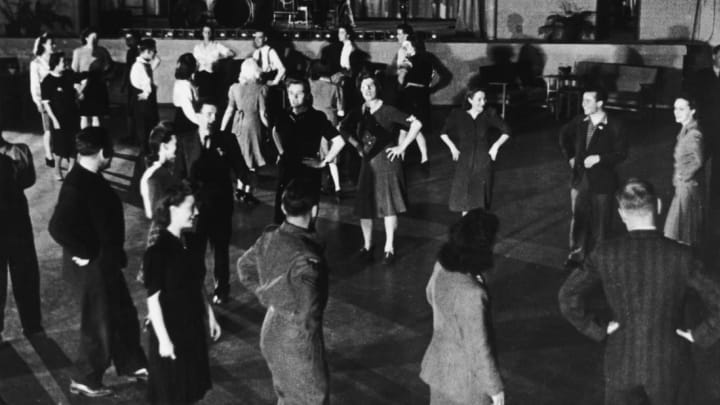"You put your right foot in,
You put your right foot out,
You put your right foot in,
And you shake it all about.
You do the Hokey Pokey,
And you turn it all around,
That's what it's all about..."
No other song seems to symbolize a good time for people and bring smiles to their faces to quite the same extent as "The Hokey Pokey." But where did this quirky song come from? It's complicated.
LONDON ORIGINS
In 1942, Irish songwriter and publisher Jimmy Kennedy, best known for "The Teddy Bear's Picnic," created a dance, and an instructional song to go with it, called "The Hokey Cokey."
Written to entertain Canadian troops stationed in London, the song was similar to the "Hokey Pokey" we all know today.
Composer Al Tabor was also entertaining Canadian troops in wartime London, and in 1942 he wrote a participation dance song called "The Hokey Pokey." He claims the name came from the London ice cream vendors of his youth, called "Hokey Pokey Men." The accompanying dance was very similar to Kennedy's.
MEANWHILE, ON THE OTHER SIDE OF THE POND ...
In 1946, totally unaware of the British "Hokey Cokey" and "Hokey Pokey," two Scranton, Pennsylvania musicians—Robert Degan and Joe Brier—recorded "The Hokey-Pokey Dance" to entertain summer vacationers at Poconos Mountains resorts. The song was a regional favorite at dances and resorts for the rest of the 1940s, but that still isn't the song we know today.
To confuse matters even more, British bandleader Gerry Hoey also claimed to have authored a similar tune, "The Hoey Oka," in 1940.
BUT THE ONE WE KNOW TODAY ...
The general belief is that Charles Mack, Taft Baker, and Larry Laprise wrote the American version of the song "The Hokey Pokey" in 1949 to entertain skiers at the Sun Valley Resort in Idaho. The song was a hit at the resorts, so Laprise recorded it.
The recording flopped, but Degan and Brier found out about it and sued Laprise for ripping off their "Hokey-Pokey Dance." Despite the fact that his version came out after theirs, Laprise won the rights to anything having to do with "The Hokey Pokey."
In 1953, Ray Anthony's orchestra recorded it—a double A-side single with "The Bunny Hop"—and it made it to #13 on the charts. That's the version we know today.
A MAGICAL HISTORY
The origins of the song, though, go back even further. Some argue that "The Hokey Pokey" (or "Cokey") is a corruption of "hocus pocus," the familiar term used by magicians.
"Hocus pocus" derives, in turn, from a Latin line in the Catholic Mass, "Hoc corpus meum" ("This is my body"), indicating the transformation of the communion "bread" into the body of Jesus Christ.
The dance that goes along with the song—in which the participants all dance in a ring, putting the relevant arm or foot in or out, and then shaking it around—goes back a fair way, too.
Similar dances and songs were recorded in Robert Chambers's Popular Rhymes of Scotland (1826); other versions have been traced to 17th-century minstrels.
THE REAL ORIGIN?
But the earliest accurate record, so far, of the song we all know and love is from an account, dated 1857, of two sisters from Canterbury, England, on a trip to Bridgewater, New Hampshire. During their visit, they taught the locals a song that went something like this:
"I put my right hand in,
I put my right hand out,
I give my hand a shake, shake, shake,
And I turn myself about."
Apparently, the performance of the song—called "Right Elbow In" and several verses long—was accompanied by "appropriate gestures" and was danced with a slow, rhythmic motion.
Whether or not an earlier reference will ever be found, it seems the origins of "The Hokey Pokey" do not lie in America, as currently claimed. The song was merely imported there. The song's great popularity definitely makes it a part of Americana, however.
Eddie Deezen has appeared in over 30 motion pictures, including Grease, WarGames, 1941, and The Polar Express. He's also been featured in several TV shows, including Magnum PI, The Facts of Life, and The Gong Show. And he's done thousands of voice-overs for radio and cartoons, such as Dexter's Laboratory and Family Guy.
